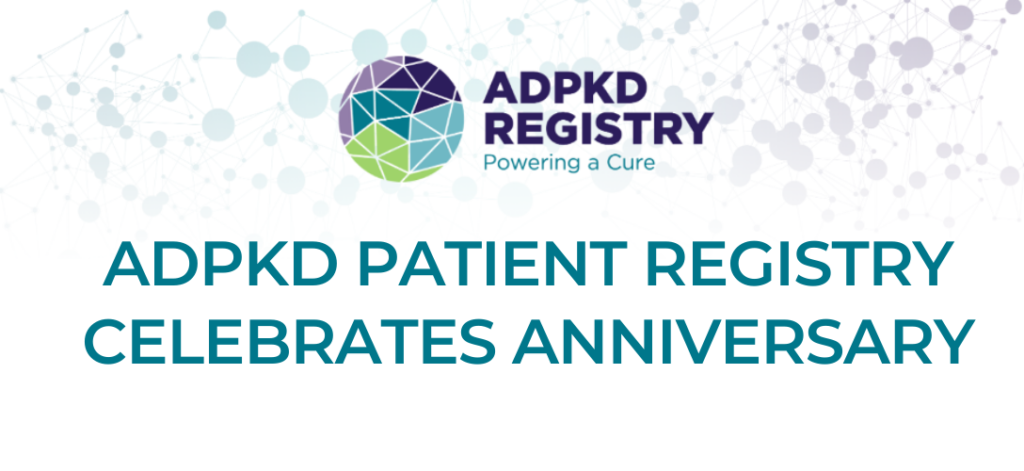 Published September 8, 2020 | When the PKDF launched the ADPKD Patient Registry a year ago, our goal was to build a network of ADPKD patients from whom we could learn about their experience with the disease in a standardized format. We wanted to make research more accessible to participants. Whether by seeing some of their data compared to other PKD patients across the U.S. in their individual Registry Dashboard or by sending details of clinical trials for which they may be eligible. We’re excited to have almost 1,800 individuals in the program and we look forward to growing further in year two.
Published September 8, 2020 | When the PKDF launched the ADPKD Patient Registry a year ago, our goal was to build a network of ADPKD patients from whom we could learn about their experience with the disease in a standardized format. We wanted to make research more accessible to participants. Whether by seeing some of their data compared to other PKD patients across the U.S. in their individual Registry Dashboard or by sending details of clinical trials for which they may be eligible. We’re excited to have almost 1,800 individuals in the program and we look forward to growing further in year two.
What makes the Registry so important?
The ADPKD Registry is unique—it’s the only direct-to-patient nationwide registry in the U.S. (many existing registries collect data from medical records or insurance claims instead of from patients themselves). Direct-to-patient registries are important for diseases like PKD, where patients are seen at many different medical centers or local nephrology clinics. In fact, current participants report getting care from over 450 different clinics. That’s why it’s important PKD patients tell us directly about their diagnosis, current kidney function, symptoms, and other details of their experience. We couldn’t learn it without them.
In addition, patient-reported aspects of a disease, including pain, fatigue, and other quality of life outcomes, draw a richer picture of the experience than would otherwise be possible to access through medical records.
What is longitudinal research and why is it exciting for ADPKD?
In the ADPKD Registry, participants enroll digitally through the online patient portal and receive prompts to fill out modules multiple times a year. The Registry asks participants to fill out three core modules when they first enroll. In our first year, we’ve released three additional modules developed by our advisory groups. To understand how individual answers may change over time, we’ve built the Registry to be longitudinal. A longitudinal program is a research design involving repeating observations (or questions) of the same people over long periods of time. This is important in PKD because it helps researchers understand how the disease progresses differently for different people. Collecting information over time can teach us which interventions work best on a bigger scale than in an individual study. Especially as new diets and therapies become available.
We’ll repeat some Registry modules yearly, others every three or six months. With our first anniversary coming up, the 455 PKD patients who enrolled in the Registry when we launched will be asked to fill out our Core Questionnaire again to tell us how their PKD has changed (such as their kidney function or current symptoms). Those who signed up in October 2019 will be asked to fill out their Core Questionnaire again in October 2020, and so on. Although the ADPKD Registry has had an incredible first year, the greater value of the program will grow as the years go on and we collect more longitudinal data.
Why is it important to keep logging back into the ADPKD Registry?
By bringing together small amounts of data from many patients, researchers can look for patterns in the data. This helps them develop new ways of predicting the disease experience or improving clinical care. It’s important that patients not only sign up but that they complete and continue completing modules year after year. The more data we collect from individual patients, the stronger our conclusions will be.
For example, we know 22% of participants have experienced frequent urinary tract infections, and 6% have had a brain aneurysm. However, only 69% of Registry participants have answered these questions. The actual number of individuals reporting these events may be much different.
What are we looking forward to in year two?
In year two, we hope the ADPKD Registry will continue to grow. We’ll be asking more questions, including kidney pain, liver cysts, and the impact of the COVID-19 pandemic on patients and their families. The Registry will send information about clinical trials to those we believe will be eligible for the studies. We’ll also begin sharing more data with participants about what we’re learning.
Who’s eligible to enroll or participate in the ADPKD Patient Registry?
We encourage people of all ages diagnosed with Autosomal Dominant Polycystic Kidney Disease (ADPKD) to join the Registry. Patients under 18 may join with the permission of a parent or legal guardian. Patients with a recent diagnosis, living with PKD, on dialysis, or post-transplant are all encouraged to participate.
___________________________________________________________
Join the ADPKD Registry, share your experience, and play a critical role in advancing research for patients everywhere. Learn more about the data collected, how the Registry can connect you to clinical studies, and how we keep your information secure. Sign up today!









Just looking for more information about pkd. I’m post transplant but both of my daughters have been diagnosed with pkd & pld.
Hi Tina – our HOPE Line staff members are available to help connect you with resources and information (https://connect.pkdcure.org/hope-line/) or this page might be a good place for you to start: https://pkdcure.org/living-with-pkd/.
I’m cramping up during dyalysis. No fluid is removed. I was wondering if there were any remedies. I find it better to sit than lie but the beds are not really meant for sitting at my center
This is very attention-grabbing, You are an overly professional
blogger. I have joined your rss feed and sit up for searching for more of your wonderful post.
Also, I’ve shared your web site in my social networks